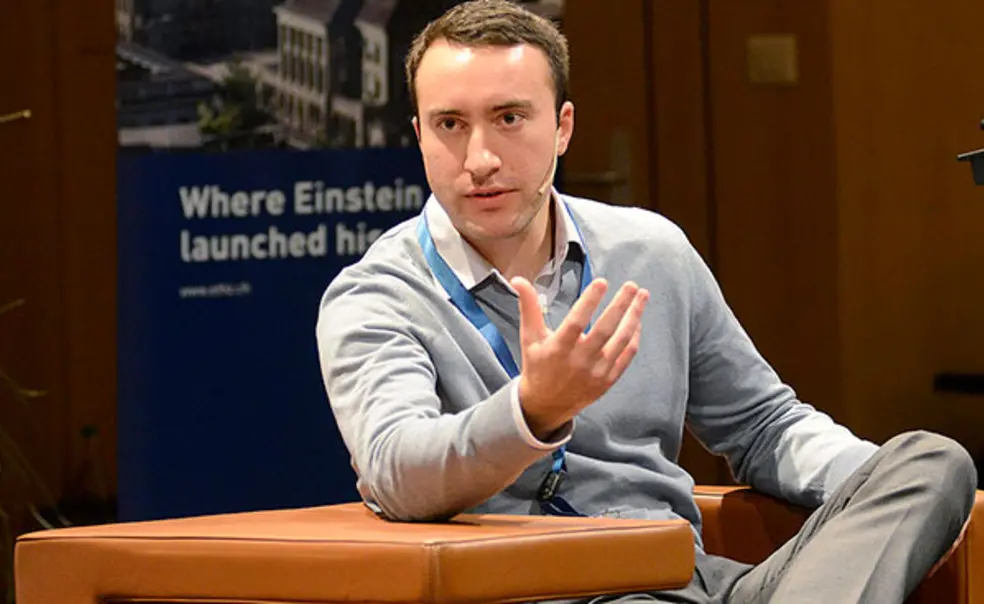James Hodson ’10 Promotes the Use of ‘AI for Good’ with New Nonprofit
James Hodson ’10 thinks robots are getting a bad rap. Wherever one turns these days, it seems another high-profile figure is predicting humanity’s demise at the hands of artificial intelligence.
There’s Stephen Hawking, who says the “development of full artificial intelligence could spell the end of the human race.” There’s Bill Gates, who thinks that within a few decades artificial intelligence will be “strong enough to be a concern.” Gates is calling for governments to start imposing “robot taxes” to slow the spread of automation. And there’s Elon Musk, who tweeted as recently as August, “If you’re not concerned about AI safety, you should be. Vastly more risk than North Korea.”
“We’re so far away from a general framework that none of these questions bear thinking about right now,” says Hodson, who led AI research at Bloomberg until 2015 and is familiar with the technology’s uses and limitations.
“In reality, these people know next to nothing about AI,” says Hodson. “I doubt Elon Musk knows how to open a Bash window on his computer.” (Bash is a popular tool for programmers running Mac and Linux operating systems to input and execute commands.)
Hodson, who grew up in the U.K., first caught “the programming bug” as a child, inspired by his uncle’s Olivetti computer store. His parents — an English marine engineer and an Italian ballet dancer — fostered their son’s budding interest in computers, with Hodson’s mother supplying a steady stream of espresso during her once sporty son’s late nights of programming.
When it came time for college, Hodson decided he wanted to go to school in the United States, of which he says he had a somewhat romanticized view as a place accepting of diversity and new ideas. The high school valedictorian picked Princeton.
Hodson majored in philosophy with a certificate in computer science. “My work was around the philosophy of language and the science of translation of languages,” Hodson says. “My degree was sort of in machine translation in some sense.”
It was also at Princeton where Hodson met his wife, Anastassia Fedyk ’10, now a Harvard economics researcher, on their first day of orientation.
“We were assigned to the same Outdoor Action group,” says Hodson. “We’ve been together ever since.”
After Princeton, Hodson went to work at Bloomberg. His career started with the problem of how to condense the 1.5 million stories Bloomberg publishes daily into a machine-readable signal; Hodson’s undergraduate work enabled him to be “the expert in the room,” he says.
After just 18 months, Bloomberg made Hodson manager of its news operation’s new machine learning hub. The role, which required him to recruit and lead a team of what ultimately expanded to 25 machine-learning experts, allowed him to see where the world of artificial intelligence research was headed. He didn’t like what he saw.
While interest in the field has exploded, coordination and quality of research have decreased, Hodson says.
“What I noticed were a lot of inefficiencies between AI research and applications in the real world,” says Hodson, who also feared the adverse impact that large technology companies were having on the field. The best data were locked behind the closed doors of the likes of Google and so was the best talent. And much of the focus in the field was on solving what amounted to the problem of optimizing advertisements — something Hodson isn’t even convinced compels people to buy products.
“It didn’t sound like the research community we should be building,” says Hodson.
In 2015, he left Bloomberg to co-found the AI for Good Foundation with former Bloomberg colleague Stefano Pacifico, NYU professor Gary Marcus, and IBM researcher Michael Witbrock. Hodson serves as CEO of the nonprofit.
The group’s mission is to steer AI technologies toward social good. Using the United Nations’ global sustainable development goals as a guide — a list that includes ending world poverty and hunger — AI for Good is currently working on a project involving agricultural data to optimize farming.
Charlotte Stanton ’00, a special adviser to AI for Good, says Hodson is “reaching across the divide from the private sector into the public sector.”
Hodson says it’s the millennial in him.
“For me the most important things weren’t the money or being in those conversations,” he says of his time at Bloomberg, where he frequently interacted with leading executives and researchers. “It was doing interesting work.”
James Hodson ’10 sent the following clarification to PAW:
“I wish to clarify my statement about Elon Musk, Bill Gates, and Stephen Hawking, which was taken out of context. I have the utmost respect for the achievements of these men in their respective fields. My point to the PAW reporter was that, in their public comments about Artificial Intelligence, they have made grandiose and unsubstantiated statements about a field with which they are less familiar, in a way that has negatively impacted public opinion.
“Understanding AI’s impacts on society is difficult, and the continued pressures of automation will require societal adaptations and policy efforts in the coming years. However, the now common belief that AI might pose an existential threat to human beings in the foreseeable future is, in my view, incorrect.”












No responses yet